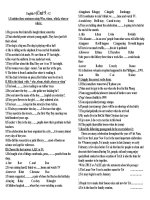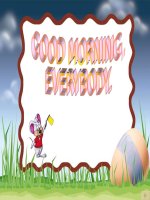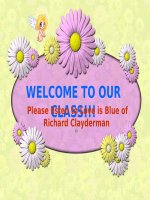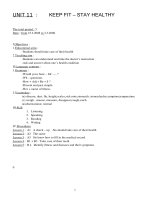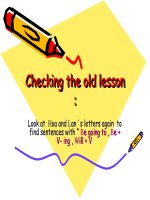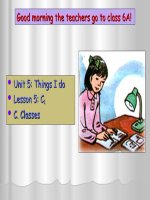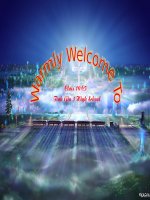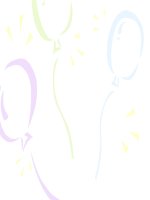Unit 1
Bạn đang xem bản rút gọn của tài liệu. Xem và tải ngay bản đầy đủ của tài liệu tại đây (831.71 KB, 27 trang )
<span class='text_page_counter'>(1)</span>Unit 1: Plurals of countable and uncountable nouns.
<span class='text_page_counter'>(2)</span> 1. Singulars (N) and Plurals (Ns) • Some examples Singulars. Plurals. An orange. Two oranges. A bat. Two bats.
<span class='text_page_counter'>(3)</span> Rules Plural = Singular + -s Some more examples: A book three books A pen some pens An apple ten apples.
<span class='text_page_counter'>(4)</span> Exceptions 1: “-s, -o, -x, -ch, -sh endings” A torch. Two torches. Three glasses A glass. A fox. Two foxes.
<span class='text_page_counter'>(5)</span> A tomato. A toothbrush. Two tomatoes. Seven toothbrushes. Nouns end in -s, -ss, -x, -o, -ch, -sh, add –es to the nouns.
<span class='text_page_counter'>(6)</span> Notes • Nouns are loan words or abbreviations that end in –o, add –s only to the nouns Eg. A radio Two radios. A photo. Two photos. Some more words: Pianos, kilos, videos, memos, bamboos, zoos,...
<span class='text_page_counter'>(7)</span> Exceptions 2: “-y” ending A butterfly. Two butterflies. A strawberry. Two strawberries. A key. Two keys. Nouns end in a consonant + “y”, change “y” to “i” and add “es” Nouns end in a vowel + “y”, add “–s” to the noun Five vowels: A, E, I, O, U.
<span class='text_page_counter'>(8)</span> Exception 3: -f, -fe endings A knife. A thief. Two knives. Two thieves. Nouns end in -f, -fe, omit -f, -fe and add –ves But a chef -> chefs, a roof -> roofs, a handkerchief -> handkerchiefs.
<span class='text_page_counter'>(9)</span> Irregular A child A man A woman A tooth A foot A goose. Children Men Women Teeth Feet Geese. A louse A mouse An ox A sheep A deer A fish A person. Lice Mice Oxen Sheep Deer Fish People.
<span class='text_page_counter'>(10)</span> Notes: • We often use “a/an” before a singular noun • “A” is used before a consonant sound, “an” before a vowel sound (a, e, i, o, u) • Eg: A banana, a book…, but: a uniform, a university An apple, an orange, an egg…, but: an hour • “A/an” means “one” • We can’t use a singular countable noun alone. It must go with a, an, one, the, my, this, that…..
<span class='text_page_counter'>(11)</span> Notes • We use cardinal numbers, some, or any, many, few… before plural nouns • Eg: two children, some beautiful girls • Some nouns are always in plural forms: jeans, trousers, scissors, glasses… • We can use a plural noun alone to say about something in general • Eg: I like bananas (= bananas in general) Children like sweets (= children and sweets in general).
<span class='text_page_counter'>(12)</span> Practice. dolphins. birds. shoes. clowns. spiders.
<span class='text_page_counter'>(13)</span> foxes. benches. dresses. mosquitoes. witches.
<span class='text_page_counter'>(14)</span> families. ladies. babies. diaries. flies.
<span class='text_page_counter'>(15)</span> mice. teeth. geese. fish. policemen.
<span class='text_page_counter'>(16)</span> Loaves Tomatoes Ladies Boys Housewives Benches Bodies Teachers Leaves Watches Countries Days Kisses Strawberries Shelves Schools Lives Addresses Babies handkerchiefs Halves.
<span class='text_page_counter'>(17)</span> Countable and Uncountable Nouns I. Countable nouns • The things we can count belong to countable nouns • Countable nouns have singulars and plurals • We use a/an/one before a singular noun • Eg: a book two books an apple two apples.
<span class='text_page_counter'>(18)</span> II. Uncountable nouns • Things we can’t count belong to uncountable nouns • Uncountable nouns haven’t got plurals • We don’t use a/an and numbers before uncountable nouns • We use some with uncountable nouns • Eg: Some beer, some bread….
<span class='text_page_counter'>(19)</span> Types of uncountable nouns • Liquid: Water, milk, wine, beer, cooking oil, petrol…. • Small units with a large number: rice, salt, sugar, sand, hair…. • Toothpaste, sun screen, butter, cheese… • Bread, meat, cake, toast,… • Fruit, luggage, money, work, homework.. • Air, gas, oxygen, … • Silk, leather, gold, cotton… • Abstract nouns: knowledge, information, news… • Names of learning subjects: English, economics, politics, biology….
<span class='text_page_counter'>(20)</span> How can we count uncountable nouns ? • We can never count an uncountable noun but we can count things that contain the nouns. • Eg: We can count water by pouring it into a glass/a cup… and we count the number of the glasses/cups • We can use a uncountable noun alone to say about things in general • Eg: You shouldn’t drink coffee before going to bed. (=coffee in general) Water doesn’t contain any calories (=water in general ).
<span class='text_page_counter'>(21)</span>
<span class='text_page_counter'>(22)</span> Some. A. Some. An. Some. A. Some. Some. A. Some. Some. A. Some. A. Some.
<span class='text_page_counter'>(23)</span> Some. Some. Some. A. Some. An. A. Some. A. Some. Some.
<span class='text_page_counter'>(24)</span> bowls. slices. glasses of. loaves. bottles.
<span class='text_page_counter'>(25)</span> pieces. cans. packets. cups. jars. pieces.
<span class='text_page_counter'>(26)</span> bowls churches teams Loaves/slices pieces horses Cups. bicycles bottles boys. ladies children cans glasses days packets bottles geese jars mice Kilos/pieces.
<span class='text_page_counter'>(27)</span> THANK YOU FOR ATTENDANCE.
<span class='text_page_counter'>(28)</span>

